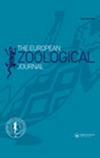Co-localization of ribosomal and telomeric sequences in Leptynia (Insecta: Phasmatodea)
引用次数: 9
Abstract
Abstract Stick insects have been studied mainly for non-conventional reproduction modes, such as parthenogenesis, hybridogenesis and androgenesis. Parallel karyological investigations have evidenced extensive numerical and structural chromosome re-patterning, particularly evident in hybrid parthenogenetic taxa. Chromosome sets of bisexual Leptynia (Pantel) species show an evolutionary trend from 40 to 36 chromosomes and are characterized by cytological satellites of variable size and localization. We performed fluorescence in situ hybridization (FISH) analysis using 45S ribosomal genes and pentameric (TTAGG)n telomere sequences as probes in two strictly related but karyotypically distinct species, L. montana Scali (2n = 38/37; XX/XO) and L. attenuata Pantel (2n = 36). L. attenuata has recently been split into three subspecies (L. attenuata attenuata, L. attenuata iberica and L. attenuata algarvica), and found to share an XX/XY sex chromosome formula, unusual for stick insects. FISH by 45S rDNA sequences consistently labelled the short arm of the 4th chromosome pair, often of a variable size. Silver staining showed that nucleolar organizer regions (NORs) are active. FISH of the telomeric repeats, besides ordinary telomeres, also labelled the short arm of this same pair. The use of both probes in double FISH analysis fully confirmed the co-localization of ribosomal and telomeric highly repeated sequences. Since it is increasingly emerging that the co-localization of NORs and telomeric sequences appears to be a feature shared by evolutionarily distant animals, its possible role is discussed.细翅虫核糖体和端粒序列的共定位
摘要竹节虫的研究主要集中在孤雌生殖、杂交生殖和雄雄生殖等非传统生殖方式上。平行核学研究已经证明了广泛的数量和结构染色体重新模式,特别是在杂交孤雌生殖分类群中。双性Leptynia (Pantel)物种的染色体组呈现40 ~ 36条染色体的进化趋势,并具有不同大小和定位的细胞学卫星。我们以45S核糖体基因和五聚体(TTAGG)n端粒序列为探针,对两个亲缘关系密切但核型不同的物种进行了荧光原位杂交(FISH)分析:L. montana Scali (2n = 38/37;XX/XO)和L. attenuata Pantel (2n = 36)。最近,人们将其分成了3个亚种(L. attenuata attenuata, L. attenuata iberica和L. attenuata algarvica),并发现它们具有相同的XX/XY性染色体,这在竹节虫中并不常见。FISH通过45S rDNA序列一致地标记第4对染色体的短臂,通常是可变的大小。银染色显示核仁组织区(NORs)活跃。除了普通的端粒外,端粒重复序列的FISH也标记了这对端粒的短臂。在双FISH分析中使用这两种探针充分证实了核糖体和端粒高度重复序列的共定位。由于越来越多的研究表明,NORs和端粒序列的共定位似乎是进化上遥远的动物共有的特征,因此本文讨论了其可能的作用。
本文章由计算机程序翻译,如有差异,请以英文原文为准。
求助全文
约1分钟内获得全文
求助全文

 求助内容:
求助内容: 应助结果提醒方式:
应助结果提醒方式:


